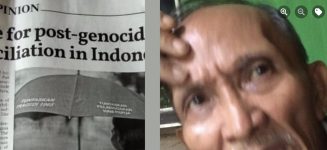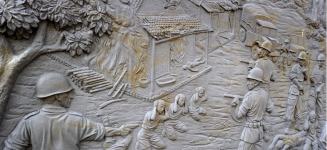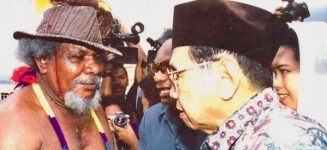With at least 33 people reportedly killed in the Wamena riots last week, the unrest in Papua has grown even more serious since the mid-August protests provoked by racial abuse and discrimination against Papuans elsewhere in Indonesia.
There can be no greater contrast than the former Indonesian territory of East Timor, now the sovereign country of Timor Leste, the fledgling nation that commemorated the 20th anniversary of its independence referendum in August.
Ironically, that jubilation was soon followed by the death of the very man who made it possible by requesting the United Nations for a referendum: Indonesia’s third president, Bacharudin Jusuf Habibie.
Connecting the Papua unrest, Timor Leste and B.J. Habibie is not to suggest some inevitable consequence. It is their differences in terms of the issues and possible solutions that justify a review.
In 1949, when the Netherlands refused to hand over Papua – then called West New Guinea or West Irian – to Indonesia, and Dutch foreign minister Joseph Luns stubbornly maintained the territorial claim for a decade until the United States pressed him to negotiate, it had a profoundly significant long-term impact for both Indonesia and Papua.
That predicament enabled some Papuans, under Dutch patronage, to express their aspirations, stimulating the growth of Papuan identity and to a lesser scale, Indonesian nationalism.
Above all, it robbed Papua from becoming part and parcel of the nation-building that was taking place across the rest of the archipelago throughout the 1950s.
Whilst Indonesia saw – and sees – as legitimate its territorial claim to Papua as part of the republic because it had been part of the Dutch East Indies, the Dutch viewed the issue in terms of its own racial classification and tried to keep the Papuans separate from the rest of the archipelago. They seemed to have forgottten that when they took over Papua, it was part of the Tidore Sultanate (present-day Maluku province).
In those days, racial issues were strangers to Asia’s newly independent countries. The independence declaration of Ho Chi Minh-led Vietnam, for example, celebrates the values of liberty and democracy, as it quotes at length the United States Declaration of Independence.
Indonesia, too, aspired to be a nation-state comprising different races, ethnics, cultures and religions, as our founding fathers and mothers made clear.
The historian M.C. Ricklefs has argued that the formation of Indonesia’s nationhood peaked in the 1950s – that is, precisely the period during which the Dutch took Papua “hostage”. This was a crucial phase of the nationalist fervor that was subsequently strengthened by what Indonesianist Herbert Feith dubbed the “solidarity-making” politicians of the 1960s, which included founding father Sukarno.
The Dutch, however, failed to understand this. Instead, it nurtured its own racial concept based on its colonial taxonomy and Calvinistic, paternalistic values while apparently developing corporate interests in Papua’s geological potential.
Economic motive, more than ever, became the prime mover.
Worse, Soeharto’s New Order treatment followed. As it is said, the regime saw a “Papua that they love (i.e. for its wealth) and the Papuans they apparently don’t”.
This was cynically manifested as early as 1967, when the Soeharto administration committed to a long-term deal with gold and copper giant Freeport McMoRan, even before the UN had formally transferred sovereignty over Papua to Indonesia in 1969. Freeport has been the first and largest foreign investor ever since.
The referendum – called Pepera or the Act of Free Choice – which was agreed in 1962 and held in 1969, turned out to be an act of intimidation orchestrated by former intelligence chief Gen. Ali Moertopo. The votes cast by 1,025 tribal chiefs were thus dubbed “the Act of No Choice”.
The sociopolitical and economic development since then, however, has made the Papua issue increasingly complex.
The Special Autonomy Law has failed to satisfy the people, as demographic changes meant that non-Papuans numbered a little fewer than Papuans, with 20 percent of Papuans living in poverty compared to Indonesia’s 9 percent, resulting in what researchers have termed “the marginalization of Papuans”.
A dialog to review the Pepera was out of the question. The Freeport enterprise has instead led to expanding networks of vested interests that involve the military, the police and the local elite amid the growing local resistance, resulting in frequent violent clashes.
Tens of thousands have been killed since 1963 according to the National Human Rights Commission (Komnas HAM). The latest clashes in Panai, Nduga and now Wamena, have only worsened the human rights crisis.
It is true that the unrest in Papua has also been triggered by several pro-independence movements. However, the Papuans are inevitably exposed to the continuing corruption among the elite and the police and military violence, and hence see their prospect in different terms.
Anthropologists confirm today what Pastor Benny Giay told me in 2000, that the Papuan concept of Indonesian colonialism was “one marked not just by economic exploitation, but by mass violence as well”.
Defense Minister Ryamizard Ryacudu, a retired general, appears to have admitted to this, if out of desperation, when he recently said, “If the Army withdrew, [Papuans] would declare independence.”
Even Gen. Bambang Dharmono (ret.), who led former president Susilo Bambang Yudhoyono’s special mission to Papua, was well aware of this critical point when he warned years ago: “If we hold a referendum [in Papua], they will vote for independence.”
A Timor Leste-like referendum is inconceivable, given that the UN definitively cut Papua from its decolonization list long ago.
But Indonesia may have arrived at a critical junction with regard to Papua, just as it did in 1999 with East Timor. Habibie was aware at the time that to retain East Timor would not only be unconstitutional, but would hurt Indonesia’s credibility in a time of economic crisis.
Today, Indonesia needs statesmanship to resolve its Papua conundrum.
The legacies of statesmen like Habibie and Abdurrahman “Gus Dur” Wahid should remind the nation that political imperatives may exist to serve humanity and human life in Papua that are worthier than the outdated statecraft of simply following the fatal logic of the state doctrine of an absolute unitary state (“NKRI harga mati”).
A true and imaginative state leader must face the issue by controlling the police and military chain of command in Papua, reviewing Indonesia’s economic exploitation and starting real dialogue – even if these may endanger his own position vis-a-vis the military elite, as both Habibie and Gus Dur endured.




Awesome post! Keep up the great work! 🙂
Great content! Super high-quality! Keep it up! 🙂
Nice web page you’ve gotten right here.
Your blog is a success, very complete. Ahhh when passion is there, everything is 🙂 Ronda Rodge Lavina
It’s in reality a nice and useful piece of information. I’m satisfied that you just shared this useful information with us. Please keep us up to date like this. Thanks for sharing. Catherine Kayne East
J’ai lu plusieurs choses excellentes ici. Signet de prix définitivement pour revisiter. Je me demande combien de fois vous tentez de créer un excellent site Web informatif. Ardyth Norman Kinelski
Wow! This could be one particular of the most beneficial blogs We’ve ever arrive across on this subject. Actually Magnificent. I’m also a specialist in this topic so I can understand your effort.
Marnia Addison Tonye
Did you hear that Justin Bieber just got a face tattoo? He did. Maible Darrell Elwira